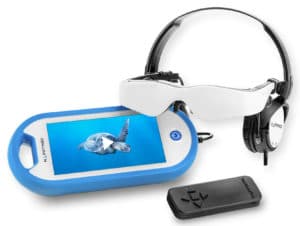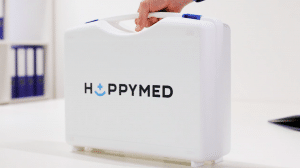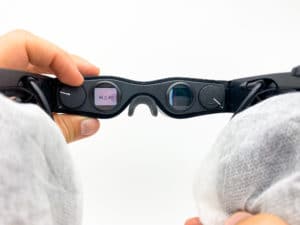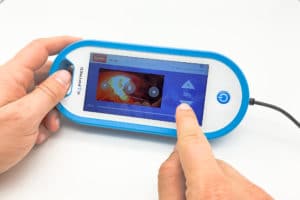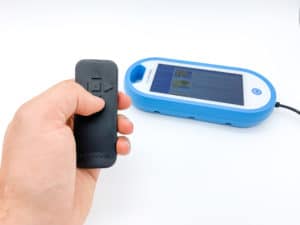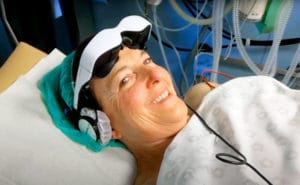Less fear, fewer sedatives and a higher acceptance rate of regional anesthesia through audiovisual sedation with video glasses?
The HappyMed video glasses now make everyday work easier for many anesthetists and nursing staff. Prof. Dr. Gisbert Knichwitz, Chief Physician for Anaesthesiology, Intensive Care Medicine and Pain Therapy at the Sana Dreifaltigkeitskrankenhaus in Cologne confirms: “Our experience shows that our patients come more relaxed and usually without fear through an operation under regional anesthesia instead of general anesthesia, without having to use other sedatives.
Positive distraction through audiovisual decoupling / sedation
Pain, anxiety, and stress then get worse when patients focus on them. The reaction here is often the use of more pharmaceutical sedation or the general selection of general anesthesia . The result, however, is longer treatment times and increased care costs . These problems can now be solved differently by audio-visual decoupling of patients from their environment or audio-visual sedation. The HappyMedSystem with video glasses , touchscreen and ergonomically adapted surround headphones makes it possible. Patients are positively distracted and reassured by being able to watch feature films, nature films or documentaries. Scary sensations then take a back seat. This reduces the feeling of stress, fear and pain and you perceive the treatment as shorter and more pleasant.
Numerous studies prove the effect
The effect of audiovisual sedation is constantly being investigated and the following positive effects have already been demonstrated:
- Higher acceptance rate of regional anesthesia: More patients choose a local anesthetic process instead of general anesthesia, if a distraction device is offered to them (Willis, 2010).
- Lower risk, fewer complications and fewer follow-up costs : Video glasses have been used throughout longer operations under epidural anesthesia already and were described as a very useful tool. Hence, by offering an audiovisual distraction device, risks, complications and follow-up costs associated with general anesthesia could be avoided (Athanassoglou, 2015)
- Less stress & anxiety : Children who experience video distraction are significantly less anxious at induction and show a significantly smaller increase in anxiety from holding to induction than children who are only distracted by nurses (Mifflin et al., 2012).
- Lower pain perception : During painful puncture procedures, audiovisual distraction can significantly decrease the intensity of pain perception in pediatric inpatients (Oliveira, Santos, & Linhares, 2017).
- Less sedatives : By providing audiovisual distraction for patients undergoing elective colonoscopy, the requirements of propofol could be reduced significantly (Lee et al., 2004). A comparative study found that audiovisual distraction by means of video glasses reduces preoperative anxiety just as well as midazolam (Kerimoglou, 2013).
- Faster recovery : Patients receiving audiovisual distraction can be discharged from the recovery room significantly earlier than patients receiving sedative premedication. This relates to emergence delirium, which occurs less often when patients receive audiovisual distraction in the preoperative setting (Seiden et al., 2014).
You can find out more in our whitepaper . Click here to request the download.
New study on HappyMed video glasses: Highly significantly less anxiety and fewer sedatives in 80% of all interventions
In the anesthesia department in the Schrobenhausen district hospital, the effect of HappyMed video glasses was examined on 88 patients over a period of 5 months .
The 5 most important results:
- The patient’s subjective level of anxiety could be significantly reduced by using the glasses.
- Over 70% of the patients felt more relaxed when wearing glasses during the procedure. Over 75% of the employees found the treatment situation to be more relaxed when the patient was using the glasses. From the medical staffs’ point of view, over 85% of the patients have benefited from using the glasses.
- According to the assessment of the treatment team, sedatives could be partially or completely reduced in over 80% of the interventions .
- Due to the hospital structure, glasses were used in over 80% of the procedures, especially in older patients (> 50 years). Although the glasses are a high-tech product, it has been shown that even less tech-savvy patients can use the video glasses without any problems.
- The decision to introduce video glasses in the anesthesiology department was beneficial from the staffs’ point of view. Staff mentioned a high degree of enrichment of their work and many advantages of the use of the video glasses in the areas of patient comfort and reducing the use of sedatives. Ultimately, everyone said they’d recommend the product to others.
Use with different variants of regional anesthesia
The video glasses are well received by young and old, because there is something for everyone in the extensive media library – even for children. Despite the distraction, doctors and nursing staff can communicate with patients at any time, because the headphones can be deactivated on the outside.
The Sana-Dreifaltigkeits-Krankenhaus Cologne uses the glasses for knee or hip replacement surgery . Because here regional anesthesia with video glasses is a good alternative to general anesthesia. The Heart Center Leipzig uses the advantages of HappyMed for cardiac pacemaker and defibrillator implantations and Asklepios uses the video glasses for operations under regional anesthesia as well as for chemotherapy or cardiac catheter examinations .
Use in the induction room and recovery room possible
HappyMed video glasses are used in many hospitals before an operation or before the induction of anesthesia. The advantages are also in the distraction from what is happening and thus a reduction in the stress level. With the glasses waiting times can be bridged well without the patient focusing all his thoughts on the upcoming procedure.
The use of video glasses relieves the nursing staff, because the amount of care required is reduced .
The certified medical product is child’s play to use by staff or patients themselves and has been extremely well received. At the beginning of 2017, a systematic evaluation of 110 HappyMed patients who were operated under regional or general anesthesia (use of glasses in the recovery room) was carried out at three locations of the Sana clinics. 92 percent of the patients were satisfied with the effects of the video glasses and would use them again if they had another operation or would recommend them to other patients.
HappyMed in detail: How exactly do the video glasses work?
- Scope of delivery : The HappyMed system is delivered to you in a case with video glasses, ergonomically adapted surround headphones and a media center. You can easily and safely transport the device between different operating theaters or the recovery room. The all-round carefree package not only includes the hardware, but also the commercial use of the films and music. You can put the glasses into operation immediately without having to install anything.
- Use in the OR : All films are stored locally on the media center. HappyMed can also be used in the operating theater without WiFi and without Internet. Since it is a certified class I medical device, we guarantee trouble-free use in the operating room.
- Operation : You or the patient can easily control the glasses using the touchscreen or remote control. For those who wear glasses, the diopters for each eye can be set separately, so that a sharp image is guaranteed. You can also activate or deactivate the headphones individually so that they can stay in contact with the patient at all times.
- The content : The program offers either entertainment or relaxation for all ages – even for children. Patients can choose between comedies, Hollywood films, classical concerts, nature documentaries, children’s films or relaxation content.
- Cleaning : The system can be completely disinfected, the earpads are renewed after each use and a cleaning schedule is an integral part.
- Duration of use : The battery life is up to 10 hours. This means that you can use glasses for several short but also for longer interventions.
Try HappyMed for 14 days for free!
Over 150,000 applications since 2015
HappyMed has been used in over 127 clinics in Germany, Great Britain, France, the Netherlands and Switzerland since 2015. It has now been used over 150,000 times .

Further information on our references:
- HappyMed at Asklepios: digital sedative for interventions
- HappyMed at Sana: cinema experience instead of general anesthesia
- HappyMed at Helios: Relaxed in the operating room
- HappyMed at Erler Kliniken: Positive distraction in the operating room through video glasses
- HappyMed in the Franziskushospital: anesthesia with cinema glasses
- HappyMed at Agaplesion: the film is over, the operation is in progress
- HappyMed at Becker Klinik: Hip and knee joint operations with gentle anesthesia
- HappyMed at the Vivantes Breast Center: Audiovisual glasses distract from operations
Numerous chief anesthetists recommend the use
We have been able to reduce the amount of sleeping pills and sedatives by 50 to 70 percent.
“So far, patients who are afraid of an operation have simply been reassured with medication. However, we have thought about how we can reduce the amount of sleeping pills and sedatives for the benefit of those affected. It is well known that 80 percent of the sensory perception takes place through the eyes and ears. Watching a film during the operation is, so to speak, the optimal distraction. Thanks to their use, we have been able to demonstrably reduce the amount of sleeping pills and sedatives by 50 to 70 percent. The enormous advantage here is that patients have to stay much shorter in the labor-intensive recovery room. If patients need about two to three hours of monitoring after an operation with general anesthesia, the viewers can be brought to the ward with local anesthesia after a good quarter of an hour, as soon as it has been clarified that they are not in pain. This also brings great relief in terms of personnel deployment. The use of glasses is particularly suitable for older patients or people with the onset of dementia, who are considerably more stressful than younger people with medication, and are now in great demand. Avoiding fear and stress during the operation also promotes the healing process. The feedback from patients who have already tried the video glasses has been extremely positive. Those who came back for surgery later ask for it again.
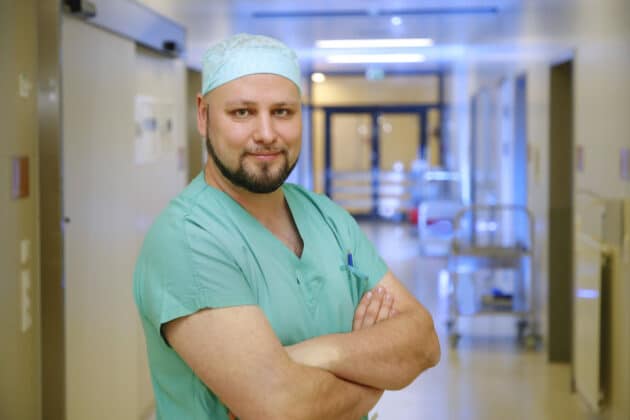
Our patients are absolutely thrilled!
"We especially offer the glasses to patients who want to distract themselves under a partial anesthetic or who are very excited before the operation. Immersed in the world of vision and sound, they quickly forget that a medical procedure is imminent or that they are currently in the operating room. In addition, the glasses often make it possible to dispense with additional tranquilizers. During an operation under regional anesthesia, many patients fear the unfamiliar surroundings or the noises during the operation. You feel stressed. The HappyMed video system offers the patient optimal visual and acoustic distraction during the operation, optionally with documentaries, Hollywood or children's films. This enables us to enormously reduce the stress level during an operation under regional anesthesia. Our experience shows that our patients come more relaxed and mostly without fear through an operation under regional anesthesia instead of general anesthesia, without having to use other sedatives. "
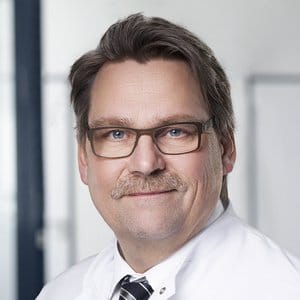
Great new opportunity!
"The problem with patients is often that they are afraid of this partial anesthetic because they do not want to hear anything about the operation, because they are afraid that the anesthesia will not work properly and say:" I want general anesthesia. " do not know about the risks of general anesthesia. This means that this method of audiovisual care for the patient during partial anesthesia is a great new opportunity. "

We are totally satisfied. The employees have completely accepted the system.
And the patients are incredibly happy about it. They are really well distracted, they are completely relaxed. "
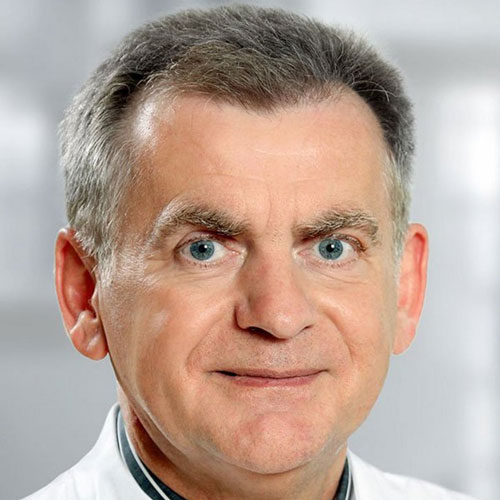
In practical application, we look forward to more relaxed patients.
"I remembered the HappyMed video glasses from a visit to the Capital Anesthesia Congress last year. I was immediately convinced of the benefits of audiovisual distraction for patients before, during, or after surgery. Since the beginning of the year we have successfully used 3 HappyMed video glasses at our clinic. In practical use, we are happy about more relaxed patients, in many cases we were even able to save sedative medication. That is a good outcome, with a lasting positive effect on the postoperative phase. "
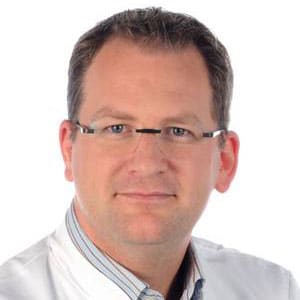
The waiting times are perceived to be shorter, which means that preoperative anxiety can be better controlled.
"The HappyMed glasses caused enthusiasm among the patients, the anesthesiologists and nurses as well as the operative partners. Interventions in local anesthesia or intravenous sedation simply run more smoothly. The waiting times are shorter, which means that preoperative anxiety can be better controlled. In children, a venous access can usually be made more easily with glasses. Children who have to undergo surgery at regular intervals asked in advance whether the glasses are free. "

We support the patient in getting through his operation without fear, without having to resort to sedatives.
"Many of our patients do not want to know exactly what is going on during the operation. However, once the fear spreads, in the past we had no choice but to give a sedative. The video system offers patients not only distraction, but also entertainment. In this way, we support the patient in getting through his operation without fear, without having to resort to sedatives. The first experiences show that our patients like to take advantage of the offer. After the procedure, we record their impressions and opinions using a questionnaire. The feedback so far has been very positive. "
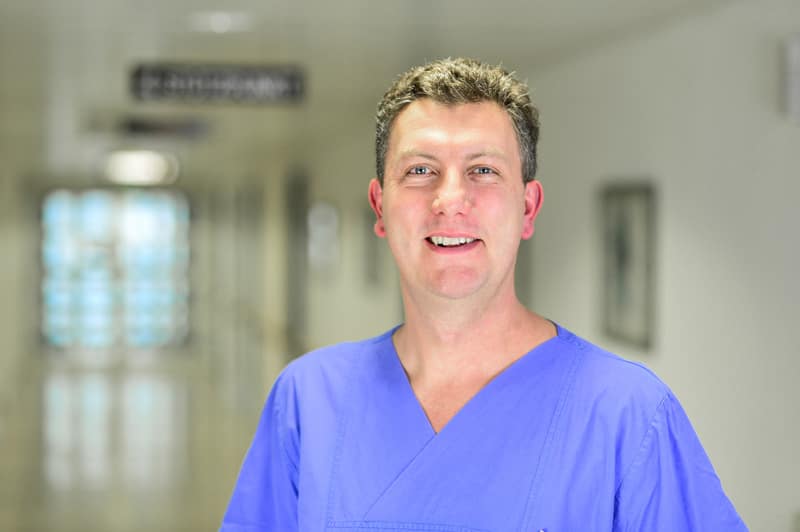
Among other things, we can reduce sedation measures and savings are made.
"We use HappyMed to 90% in the area of regional anesthesia and that in almost all variants (spinal, plexus, etc.). We use the glasses every day for about 5 hours. The patients react very positively to the video glasses. With older patients we need a little more time to explain, but the video glasses are generally well received by younger and older patients. I see the greatest advantage in the great calming down of patients: excited patients benefit from the extensive shielding from ambient noise and the good distraction caused by the films. This enables us to reduce sedation measures, among other things, and savings are made here. In any case, I would recommend HappyMed to my colleagues in anesthesia. "

Nine out of ten patients later tell us that they would use them again.
"Many find the glasses very pleasant. They tell us that the glasses can distract them very well. It is probably the case that the brain is very busy with visual and acoustic stimuli - although you can also hear the" trappings " Patients are also approachable, but they are calmer. And nine out of ten tell us later that they would use them again. "

Makes work easier for both doctors and anesthesiologists.
The HappyMed video glasses distract the patient from unpleasant sensations, stimulate the brain with positive impressions and relaxation occurs. Scary sensory impressions are faded out and the patients concentrate so much on the video content that pinpricks or even unpleasant touches can be below the negative limit of perception. This fact makes work easier for both doctors and anesthetists. "
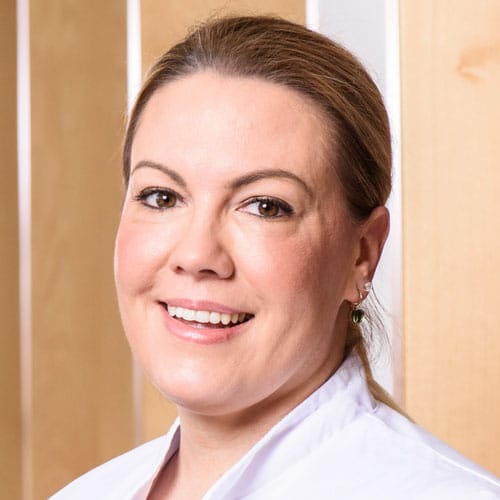
Children are less stressful and hardly need any medication to calm them down.
"I am enthusiastic about the positive effect on our little patients. The children who watch a film on the way to the operating theater are much less stressful and hardly need any medication to calm them down. "

With this product, patients can experience their treatment in a more relaxed, distracted and stress-free manner.
For many patients, the thought of medical treatment is enough to trigger anxiety and stress. The loss of control means that they focus even more on their surroundings and react over-sensitively to a wide variety of sensory impressions, such as the beeping of the machines. There is an increased release of cortisol, which increases blood pressure and accelerates pulse and breathing. With this product, patients can experience their treatment in a more relaxed, distracted and stress-free manner. "

Patients who use the glasses have a balanced breathing rate, lower blood pressure, and a slower heartbeat.
"You are simply more relaxed and that has a positive effect on the course of the operation. Another positive effect: less medication is required and that also reduces the side effects after the operation. The glasses are also used at the request of the patient when they wake up after a general anesthetic in the recovery room from the operating room, because here too the use of video glasses helps the patient to recover. "

We were amazed at the immediate positive effects, as well as at the acceptance in the clinics, by employees and patients.
"For us, the patient's well-being comes first - and for this we also like to use innovative and convincing technologies". We were amazed at the immediate positive effects, as well as at the acceptance in the clinics, by employees and patients. Patients breathe more slowly with glasses, their heart beats more calmly, the individual pain sensation decreases and so fewer medicinal sedatives are needed. Overall, the acceptance rate of gentle regional anesthesia instead of general anesthesia is increasing. Doctor and hospital phobias can also be positively influenced in this way. Ultimately, the use of video glasses leads to higher patient satisfaction, as the manufacturer has established. "

Less use of sedatives / anesthetics and faster regeneration after the operation!
“The top priority is to relieve our patients of fear and discomfort before a medical procedure. The Happymed video glasses support our individual patient treatment, lead to fewer sedatives / anesthetics and faster regeneration after the operation. "

Thanks to the HappyMed video glasses, patient acceptance of regional anesthesia procedures is also increasing.
Almost without exception, additional sedation can be completely dispensed with. Their use is therefore an effective measure to reduce postoperative cognitive deficit states with extended hospital stays - especially in older patients. HappyMed is therefore a win-win for both patient and hospital. "

In summary: The facts about HappyMed – a certified medical product
- Certified medical product class I in the 3rd product generation : trouble-free use in the operating room with other devices possible.
- In use since 2015 . Already used over 150,000 times in 127 clinics . Among other things in numerous Helios, Asklepios, Sana clinics and in the Charité University Medicine Berlin .
- The new way of positive distraction and reassurance for patients during medical interventions and operations - although addressing them is still possible throughout.
- Correlation between positive audiovisual sedation and lower feelings of stress, fear and pain proven by numerous studies and evaluations in leading clinics.
- Stunning Cinema Experience: Large selection of feature and nature films as well as documentaries. There is something for everyone - even for children!
- Immediate Usability: Compact & mobile system, meaning no installation work!
- Intuitive Use: Nursing staff and patients can control the device with the touch screen or remote control.
- Easy Cleaning: The system can be completely disinfected, earpads quickly exchanged, and a cleaning plan is available.
- Battery life up to 10 hours : suitable for many short but also for several longer interventions
- Rental model for device and film licenses: monthly costs of 199 euros for glasses
- Business benefits through more regional anesthesia instead of general anesthesia, lower medication costs, relief for the nursing staff and shorter time spent in the recovery room.
- Free, non-binding test possible for 14 days!
Try HappyMed for 14 days for free!
RTL report on the use in a knee operation

Recent studies, field reports and evaluations

Hollywood film against fear: Sana Kliniken use HappyMed video glasses in the operating room, in radiology and in the cardiovascular center
© Sana Kliniken Lübeck The HappyMed video glasses have been used in numerous Sana clinics since 2017 – recently also in the Sana clinics in Lübeck. For more patient comfort during treatments – Interventional Radiology at Sana Kliniken Lübeck uses
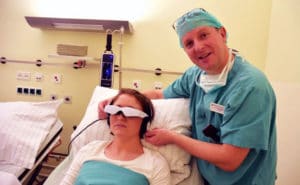
Video glasses instead of sedative pills: HappyMed in use in Helios clinics and the Leipzig Heart Center
Dr. Carsten Külls with HappyMed video glasses © Helios Klinik Schleswig The HappyMed video glasses have been inspiring many in the Helios clinic chain since 2017. The Helios Clinic in Schleswig, in Schkeuditz or the Heart Center Leipzig and the
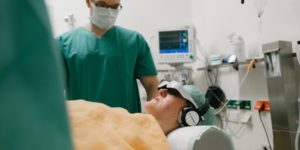
HappyMed video glasses as “digital sedatives” in Asklepios clinics
HappyMed before the operation © Asklepios Klinikum Harburg Since 2019 , 9 Asklepios clinics (in Harburg, Birkenwerder, Lindau, Weißenfels, Langen-Seligenstadt, Schwalmstadt, Wiesbaden, Bad Tölz and the southern Palatinate clinics in Kandel and Germersheim) have been using HappyMed video glasses as
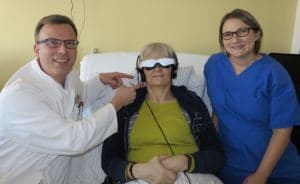
Reduced anxiety in 62% of patients – two evaluations in the Christophorus clinics
Thanks to video glasses, no more fear in the operating room – anesthesiological clinic successfully uses HappyMed video glasses Dr. Ulrich Frohnhoff, specialist in anesthesiology © Christophorus Kliniken The clinic for anesthesiology and operative intensive care medicine in the Christophorus
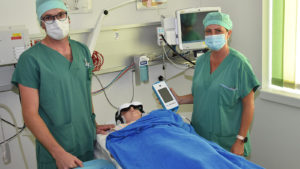
HappyMed distracts children before the operation and the use of medication can be reduced by 50 – 70 percent
HappyMed video glasses distract the child before the operation © Hospital of the Barmherzigen Schwestern Ried The HappyMed video glasses not only help adults, but are also very popular with children of different ages. When it comes to distraction and
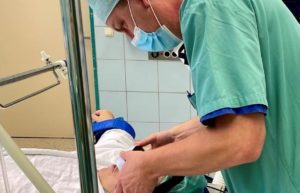
DELETE
HappyMed video glasses in action © Kreiskrankenhaus Schrobenhausen asdfasdfa I DON’T KNOW WHAT THIS IS MEANT TO BE In the anesthesia department in the Schrobenhausen district hospital, the effect of HappyMed video glasses was examined on 88 patients over a








